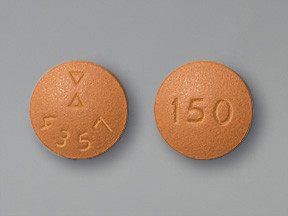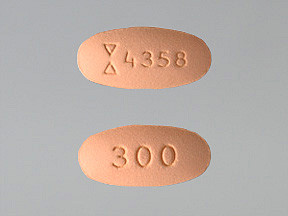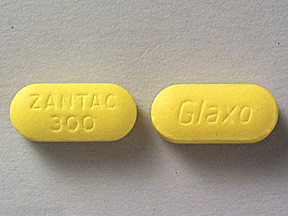RANITIDINE TABLET - ORAL
PHONETIC PRONUNCIATION: (ra-NI-ti-deen)
COMMON BRAND NAME(S): Zantac
GENERIC NAME(S): ranitidine HCl
Uses
USES: Ranitidine is used to treat ulcers of the stomach and intestines and prevent them from coming back after they have healed. This medication is also used to treat certain stomach and throat (esophagus) problems (such as erosive esophagitis, gastroesophageal reflux disease-GERD, Zollinger-Ellison syndrome). It works by decreasing the amount of acid your stomach makes. It relieves symptoms such as cough that doesn't go away, stomach pain, heartburn, and difficulty swallowing. Ranitidine belongs to a class of drugs known as H2 blockers. This medication is also available without a prescription. It is used to prevent and treat heartburn and other symptoms caused by too much acid in the stomach (acid indigestion). If you are taking this medication for self-treatment, it is important to read the manufacturer's package instructions carefully so you know when to consult your doctor or pharmacist.
How to use RANITIDINE TABLET - ORAL
HOW TO USE: Take this medication by mouth with or without food as directed by your doctor, usually once or twice daily. It may be prescribed 4 times a day for some conditions. If you are taking this medication once daily, it is usually taken after the evening meal or before bedtime. The dosage and length of treatment are based on your medical condition and response to therapy. In children, dosage may also be based on body weight. Follow your doctor's instructions carefully. You may take other medications (e.g., antacids) for your condition as recommended by your doctor. Take this medication regularly in order to get the most benefit from it. To help you remember, take it at the same time(s) each day. Do not increase your dose or take it more often than prescribed. Do not stop taking this without your doctor's approval because this may delay healing of the ulcer. If you are using nonprescription ranitidine for self-treatment of acid indigestion or heartburn, take 1 tablet by mouth with a glass of water as needed. To prevent heartburn, take 1 tablet by mouth with a glass of water 30-60 minutes before eating food or drinking beverages that cause heartburn. Do not take more than 2 tablets in 24 hours unless directed by your doctor. Do not take for more than 14 days in a row without talking with your doctor. Tell your doctor if your condition does not improve or if it worsens.
Side Effects
Precautions
Interactions
Overdose
Images

- color
- beige
- shape
- round
- imprint
- logo and 4357, 150

- color
- beige
- shape
- round
- imprint
- logo and 4357, 150

- color
- beige
- shape
- oblong
- imprint
- logo and 4358, 300

- color
- beige
- shape
- oblong
- imprint
- logo and 4358, 300
Reviews
Faq for RANITIDINE TABLET - ORAL
Ranitidine tablet is used to treat and prevent ulcers in the stomach and intestines, as well as to treat conditions such as gastroesophageal reflux disease (GERD) and Zollinger-Ellison syndrome.
Ranitidine tablet belongs to a class of medications called H2 blockers. It works by reducing the amount of acid produced in the stomach, thus relieving symptoms and promoting healing of ulcers and other related conditions.
It is generally recommended to take Ranitidine tablet as directed by your doctor. Typically, it is taken orally with or without food, usually once or twice daily. Follow the instructions on the label or as prescribed by your healthcare provider.
Some common side effects of Ranitidine tablet include headache, constipation or diarrhea, nausea, vomiting, dizziness, and stomach pain. If any of these side effects persist or worsen, it is important to consult your doctor.
Ranitidine can potentially interact with certain medications, so it is important to inform your doctor about all the medications you are taking, including over-the-counter drugs, vitamins, and herbal supplements. Your doctor can recommend any necessary adjustments or precautions.
It is important to consult your doctor before taking Ranitidine tablet during pregnancy or while breastfeeding. Your doctor can weigh the potential benefits against any possible risks and provide appropriate guidance.
Drinking alcohol while taking Ranitidine tablet may increase the risk of certain side effects, such as dizziness or drowsiness. It is generally advisable to limit or avoid alcohol consumption while on this medication.
Ranitidine tablet typically starts working within an hour of taking it, providing relief from symptoms such as heartburn. However, the complete healing of ulcers may take several weeks.
It is important to complete the full course of treatment as prescribed by your doctor, even if your symptoms improve or disappear. Abruptly stopping the medication may lead to the recurrence of symptoms or the reappearance of ulcers.
Disclaimer
IMPORTANT: HOW TO USE THIS INFORMATION: This is a summary and does NOT have all possible information about this product. This information does not assure that this product is safe, effective, or appropriate for you. This information is not individual medical advice and does not substitute for the advice of your health care professional. Always ask your health care professional for complete information about this product and your specific health needs.


No Reviews Yet